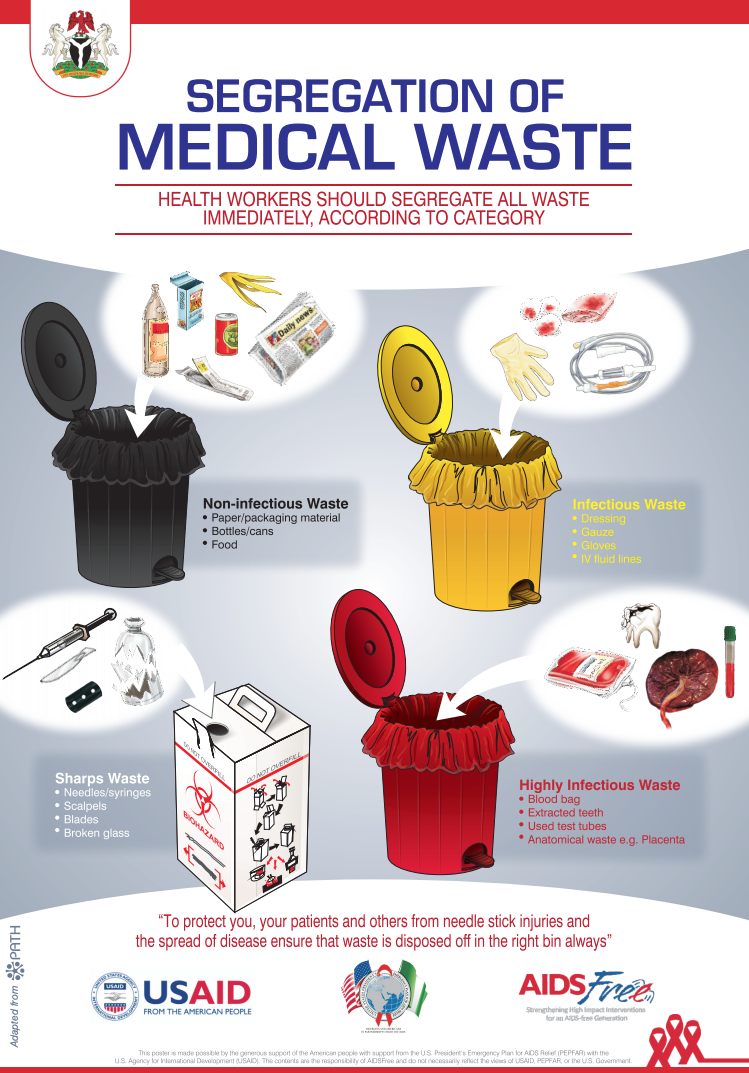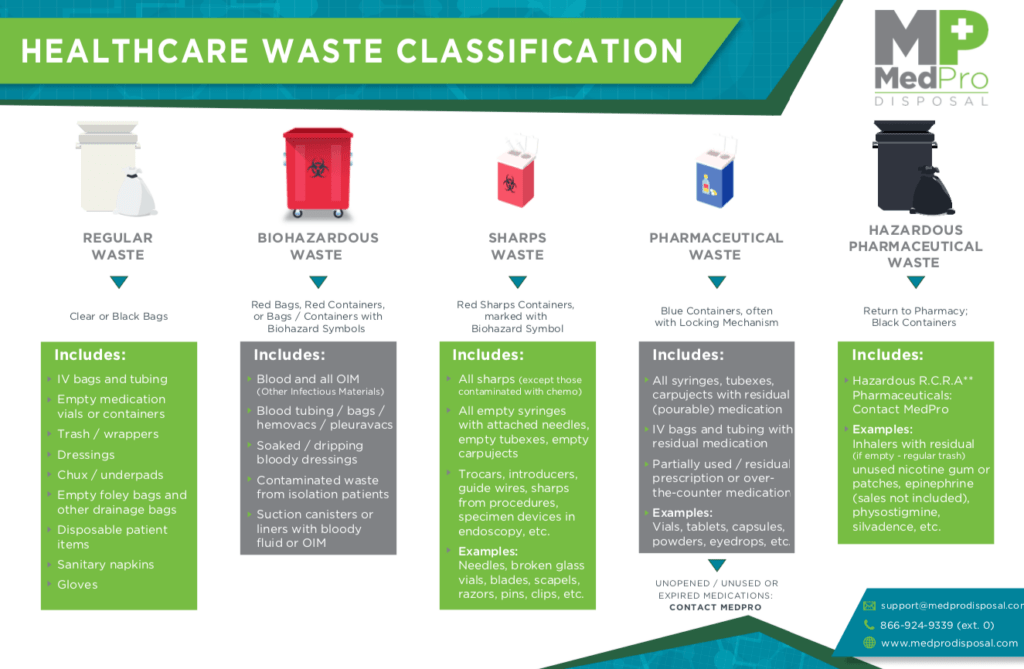Specialist Medical Waste Disposal Service: Securing Your Facility and Community
Wiki Article
Correct Disposal Strategies for Clinical Waste
Proper disposal methods for clinical waste are of utmost significance in guaranteeing the safety of both healthcare workers and the basic public. The ideal handling and disposal of clinical waste is vital to avoid the spread of transmittable illness and the contamination of the atmosphere. This consists of the secure disposal of sharps, contagious waste, and pharmaceutical waste. Following rigorous standards set by regulatory bodies is important to maintain compliance with legal regulations and shield public health. This intro will explore the importance of correct medical garbage disposal, supply guidelines for managing different sorts of waste, and highlight the requirement for healthcare facilities to adopt best practices. By adhering to these guidelines, doctor can add to a more secure and healthier environment for all.Importance of Proper Medical Garbage Disposal
Correct medical waste disposal is of utmost significance in order to stop the spread of infections and secure public health and wellness. Clinical waste refers to any kind of waste generated throughout medical treatments or from the healthcare sector.Among the primary reasons for correct medical garbage disposal is to stop the spread of infections. Medical waste can harbor different virus, consisting of bacteria, viruses, and various other bacteria that can cause diseases. Improper disposal can bring about the contamination of surface areas, water resources, and air, enhancing the threat of infections. By securely throwing away medical waste, the possibilities of direct exposure to these microorganisms are considerably lowered, ensuring the safety and security of medical care workers, people, and the area at huge.
Additionally, appropriate clinical waste disposal is necessary for shielding public health and wellness. By adhering to correct disposal methods, such as containment, therapy, and partition, we can reduce the prospective threats associated with medical waste and safeguard the wellness of the neighborhood.
Handling and Disposing of Sharps
When it involves the handling and disposal of sharps, adherence to proper methods is important for making sure the safety of healthcare workers and avoiding the threat of injury or infection. Sharps consist of needles, syringes, lancets, and various other items with the potential to cut the skin or pierce. Because of their potential to send bloodborne virus, such as HIV and hepatitis B and C, it is vital to dispose and manage of sharps correctly.
Disposal of sharps containers need to follow neighborhood guidelines and standards (WasteX Medical Waste Disposal). It is essential to never evaluate needles or bend, break, or get rid of needles from syringes. When the container is full, it needs to be safely sealed and thrown away according to regional policies. It is best to utilize licensed clinical garbage disposal services that focus on the proper handling and disposal of sharps to ensure conformity with policies and decrease risks to medical care employees and the atmosphere.
Guidelines for Contagious Garbage Disposal
Transmittable waste, also understood as biomedical or biohazardous waste, refers to materials that are possibly contaminated with transmittable agents or other unsafe compounds. Proper disposal of transmittable waste is vital to guarantee the safety and security and health of healthcare workers, clients, and the general public.The guidelines for contagious waste disposal vary depending on the country and local guidelines, however there are some common techniques that health care centers need to follow. All contagious waste should be set apart from various other kinds of waste at the point of generation. Infectious waste needs to be delivered and disposed of by certified waste administration firms that specialize in dealing with biomedical waste.
It is very important for health care centers to have thorough training programs in place to inform personnel on the proper procedures for transmittable garbage disposal. This consists of training on waste segregation, storage, and managing techniques. By adhering to these standards, health care centers can effectively manage transmittable waste, lower the danger of infections, and protect public health.
Ideal Practices for Pharmaceutical Waste Disposal
Pharmaceutical garbage disposal should always be carried out consistently and in conformity with professional guidelines. Proper management of pharmaceutical waste is important to shield public wellness and the setting. Drugs can present a substantial danger otherwise thrown away correctly, as they may pollute water resources, injury aquatic life, and even add to the development of antibiotic resistance.Among the very best practices for pharmaceutical garbage disposal is to establish a designated collection system within health care centers. medical waste disposal service. This system must include separate containers for various kinds of pharmaceutical waste, such as expired medicines, extra medicines, and infected products. These containers should be plainly identified and located in easily obtainable locations to urge correct disposal by health care professionals
Furthermore, it is important to educate medical care personnel about the appropriate handling and disposal of pharmaceutical waste. Educating programs must concentrate on determining various types of pharmaceutical waste, understanding the connected threats, and complying with the appropriate disposal procedures. Routine reminders and updates need to be given to guarantee compliance with disposal standards.
In addition to inner practices, medical care centers need to also develop partnerships with qualified waste management business. These firms concentrate on the collection, transport, and disposal of pharmaceutical waste. By dealing with these specialists, medical care centers can ensure that their pharmaceutical waste is disposed of safely and in conformity with neighborhood regulations.
Compliance With Legal Regulations
In order to make sure compliance with legal laws, it is essential for health care facilities to follow correct disposal strategies for medical waste. Medical waste positions a considerable risk to public wellness and the atmosphere, making it crucial for medical care centers to handle and get rid of of it according to the regulation.
Regulatory bodies, such as the Occupational anchor Security and Wellness Management (OSHA) and the Epa (EPA), have developed guidelines and requirements for the proper disposal of medical waste - WasteX Medical Waste Disposal. These regulations intend to secure health care workers, waste management personnel, and the basic public from prospective threats related to medical waste

Non-compliance with legal laws can lead to extreme consequences for health care facilities, consisting of penalties, legal responsibilities, damages to online reputation, and possible injury to public health. It is important for medical care facilities to remain up-to-date with the most current policies and continuously monitor and boost their waste administration methods.
Conclusion
In verdict, appropriate disposal strategies for medical waste are critical to make sure the security of healthcare employees, individuals, and the atmosphere. Abiding by standards for taking care of and getting rid of of sharps, transmittable waste, and pharmaceutical waste is necessary. Conformity with lawful laws is needed to prevent the spread of infections and protect public health and wellness. It is imperative that health care facilities keep stringent methods for the proper disposal of medical waste to reduce dangers and preserve a safe health care environment.Medical waste refers to any waste created during medical procedures or from the medical care market. Infectious waste, likewise known as biohazardous or biomedical waste, refers to materials that are potentially infected with transmittable agents or other harmful compounds. All contagious waste needs to be set apart from other kinds of waste at the point of generation. Transmittable waste needs to be carried and disposed of by accredited waste monitoring business that specialize in handling biomedical waste.
Adhering to standards for getting rid of and handling of sharps, contagious waste, and pharmaceutical waste is necessary. (medical waste removal)
Report this wiki page